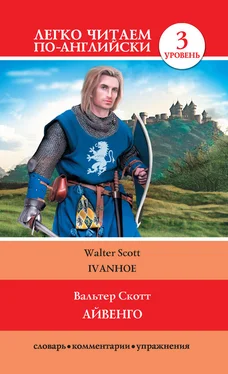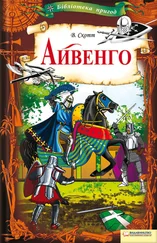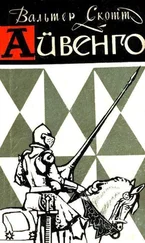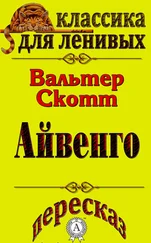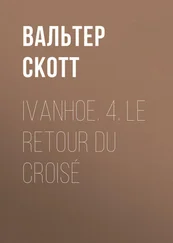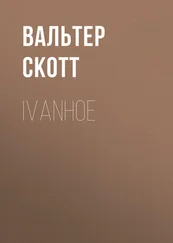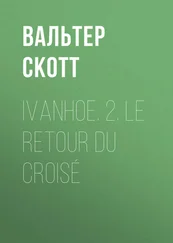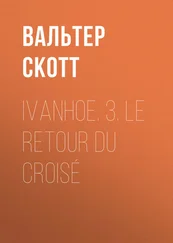Ivanhoe woke up only in the evening. To his great surprise he found himself in a room decorated in the Eastern fashion. Then an Eastern lady appeared who made a sign showing that he should be silent and examined his wound. She performed her task with a graceful and dignified simplicity and modesty.
“Gentle maiden,” began Ivanhoe in the Arabian tongue, which he thought most likely to be understood by the lady in a turban.
But he was interrupted by his beautiful doctor, who could not suppress a smile in spite of her usual melancholy. “I am from England, Sir Knight, and speak the English language, although my dress and my ancestors belong to another climate.”
“Noble lady,” again the Knight of Ivanhoe began; and again Rebecca interrupted him.
“Don’t call me noble, Sir Knight,” she said, “You should know that I am Jewish. I am the daughter of that Isaac of York, to whom you were lately a good and kind lord. It well becomes him, and those of his household, to take care of your wound.”
She informed him of the necessity they were under of removing to York, and of her father’s resolution to transport him there, and tend him in his own house until his health should be restored. Ivanhoe shared the prejudices against the Jews and didn’t want to stay in a Jewish house. Rebecca had an answer to that.
“Sir Knight, if you want me to be your doctor, you cannot change your lodging. No Christian doctor could let you fight again within a month.”
“And how soon will you enable me to wear my armour?” said Ivanhoe, impatiently.
“Within eight days, if you are patient and obey my directions,” replied Rebecca.
“It is no time for me or any true knight,” said Wilfred, “to be sick and in bed.”
“You will put on your armour on the eighth day,” said Rebecca, “if you give me one reward.”
“If it is within my power,” replied Ivanhoe, “I will give it thankfully.”
“I will only ask you,” answered Rebecca, “to believe that a Jew can do good service to a Christian without any other reward than the blessing of the Great Father who made us all.”
When the Jew, with his daughter and her wounded patient were captured by the Norman party, De Bracy looked into the litter and discovered to his surprise that the litter contained a wounded man, who called himself to be Wilfred of Ivanhoe.
The ideas of chivalrous honour, which never completely abandoned De Bracy, prohibited him from doing the knight any injury in his defenceless condition or betraying him to Front-de-Boeuf. So De Bracy commanded two of his own squires to take care of the litter and to carry Ivanhoe under the name of a wounded comrade to a distant apartment in the castle. When Front-de-Boeuf saw them, he ordered them to go to the walls and told Urfried to look after the wounded man. The old woman was easily persuaded to trust Rebecca with the care of her patient.
* * *
When Rebecca came to his room she told him the news: the castle was attacked. Soon after they heard the noise of the defensive preparations. Ivanhoe was like a war-horse, impatient at his inactivity. “If I could only drag myself,” he said, “to that window to watch the fight!”
“You will injure yourself if you try, noble knight,” replied Rebecca. When she saw how anxious he was, she added, “I myself will stand at the window, and describe to you as I can what happens there.”
“You must not!” exclaimed Ivanhoe, “The archers will aim at every window, and some random arrow—”
“It will be welcome!” muttered Rebecca.
“Rebecca, dear Rebecca!” exclaimed Ivanhoe, “at least, cover yourself with that old shield.”
After Rebecca followed this direction of Ivanhoe, she could with some security watch part of what was happening outside the castle, and report to Ivanhoe the preparations which the attackers were making for the storm.
“Do they have a flag?” asked Ivanhoe.
“No, they don’t,” answered Rebecca.
“This is strange! And do you see who can be their leaders?”
“I see a knight in black armour,” said Rebecca; “He alone is armed from head to heel, and seems to direct everybody around him.”
“Any other leaders?” asked the wounded knight.
“I cannot see any, but they can be on the other side of the castle,” said Rebecca; “They are preparing to attack. They raise their bows!”
Her description was here suddenly interrupted by the signal for attack, which was answered by the sound of the Norman trumpets from the walls.
The battle began. The archers shot so many arrows, that every window was hit, and immediately two or three of the garrison were killed and several others wounded. But the followers of Front-de-Boeuf and his allies showed as much obstinacy in defence as the attackers fury in attack and replied with the discharge of their large cross-bows, and, as the assailants were less protected, did considerably more damage.
“Look for the Black Knight,” asked Ivanhoe.
“I can see him now, he leads a body of men close under the outer barrier of the barbican,” said Rebecca, “They pull down the palisade with axes. – They have made a breach in the barriers—they rush in—they are driven back! – Front-de-Boeuf leads the defenders, I see him in the crowd. They attack again. God of Jacob! It is like the conflict of two oceans moved by different winds!”
She turned her head from the window.
“Look again, Rebecca,” said Ivanhoe.
Rebecca looked out again, and almost immediately exclaimed, “Holy prophets of the law! Front-de-Boeuf and the Black Knight fight hand to hand on the breach, their followers watch and shout!” Then she exclaimed, “He is down! – he is down!”
“Who is down?” cried Ivanhoe; “for our dear Lady’s sake, tell me which has fallen?”
“The Black Knight,” answered Rebecca, faintly; then instantly again shouted joyfully—”But no—but no! – the name of the Lord of Hosts be blessed! – he is on foot again, and fights. – His sword is broken—he takes an axe from a yeoman—he presses Front-de-Boeuf with one blow after another—The giant falls—he falls!”
“Front-de-Boeuf?” exclaimed Ivanhoe.
“Front-de-Boeuf!” answered the Rebecca; “his men run to rescue him, led by the Templar—together they stop the Black Knight. They drag Front-de-Boeuf within the walls.”
“They attack the wall of the barbican, and some put up ladders, but the ladders are thrown down,” said Rebecca, shuddering; “the soldiers lie under them like crushed reptiles—The besieged have the better. The Black Knight approaches the small gate with his huge axe—the small gate shakes, it crashes—it is splintered by his blows—they rush in—the outwork is won—Oh, God! – they throw the defenders from the walls—Oh men, if you are still men, don’t kill those who can resist no longer!”
“The bridge—the bridge which communicates with the castle—have they taken it?” exclaimed Ivanhoe.
“No,” replied Rebecca, “The Templar has destroyed the plank on which they crossed—few of the defenders escaped with him into the castle—the cries which you hear tell the fate of the others—I see it is still more difficult to look upon victory than upon battle”.
“Now it is over for the time,” she continued; “our friends strengthen themselves within the outwork which they have conquered”.
* * *
During the quiet interval which followed the first success of the attackers the Templar and De Bracy met in the hall of the castle.
“Where is Front-de-Boeuf?” said De Bracy, who fought on the other side of the castle, “men say he has been killed.”
“He lives,” said the Templar, coolly, “but in a few hours he will be with his fathers. Let us think how we can defend the castle. We have lost the barbican.”
Читать дальше
Конец ознакомительного отрывка
Купить книгу
